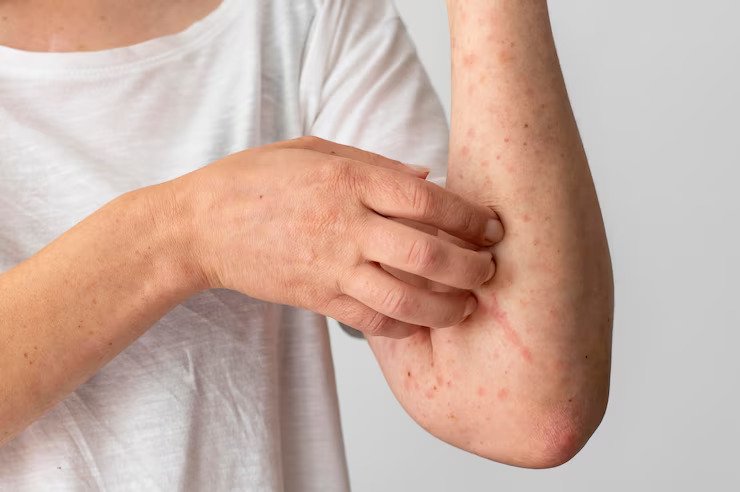Preventive Healthcare
Syphilis: Symptoms, Causes, Disease, Diagnosis and Treatment

Table of Contents
Syphilis is a type of sexually transmitted disease (STD) caused by bacteria named treponema pallidum.
Signs and symptoms of Syphilis
Syphilis infection develops in four different stages. Each stage has different signs and symptoms.
Primary Stage
- During this stage, a person may notice one or multiple sores of syphilis.
- Generally, sores are located where first contact occurred and syphilis entered your body.
- You might observe sores in, on, or near the penis, vagina, anus, rectum, lips, or mouth.
- Sores are usually firm, circular, and pain-free, but this is not always the case.
- A patient may notice sores for up to six weeks that may heal without treatment.
- To stop the infection from progressing, you must continue treatment even after the sores heal.
Secondary Stage
- The patient develops skin rashes and/or sores in the mouth, anus and vagina.
- The secondary stage generally starts with rashes on one or multiple locations of the patient's body.
- These rashes may develop several weeks after the primary sores have healed.
- Rashes can also appear on your palms and soles and are typically red, rough, and reddish-brown.
- These rashes are non-itchy, and sometimes they are faint, so people will not notice them.
- Other symptoms may include swollen lymph nodes, high body temperature, sore throat, loss of hair, loss of weight, muscle pain, headache and general weakness.
- The symptoms will not go away without treatment. If you don't get treated at this stage, syphilis might worsen.
Latent Stage
In this stage, patients may suffer from syphilis with no visible signs and/or symptoms. Without treatment, a patient may be a carrier of this infection in his body for up to years.
Tertiary Stage
About 14 to 40% of patients enter the last stage of this infection. It occurs years after the initial stages of infection. The tertiary stage of syphilis can be life-threatening and damage patients' internal organs, which may lead to coma and even death.
Symptoms include blindness, hearing loss, mental health issues, loss of memory, bone and soft tissue destruction, heart diseases, meningitis and neurosyphilis.
Causes of Syphilis
It is caused by infection due to bacteria called treponema pallidum.
Transmission of Syphilis
Syphilis infection is transmitted from person to person by direct contact during vaginal, anal or oral intercourse. It can be transmitted to unborn babies from infected mothers.
Syphilis can also be transmitted through contact with objects, like
- Toilet seat
- Door and window knobs
- Swimming tank
- Hot tubs
- Bathtubs
- Clothes
- Utensils
Neurosyphilis, Ocular Syphilis and Otosyphilis
If a patient does not receive the proper treatment, syphilis may enter the brain, eyes and ears, leading to neurosyphilis, ocular syphilis and otosyphilis.
Neurosyphilis signs and symptoms
Patients may experience severe headaches, weakness and trouble moving muscles. Patients may also experience a change in mental state (such as focusing problems, confusion, vertigo etc.) and/or dementia.
Ocular Syphilis Signs and Symptoms
Signs and symptoms of ocular syphilis may include eye pain, redness of eyes and change in vision or blindness.
Otosyphilis Signs and Symptoms
A person with otosyphilis may suffer from hearing loss, tinnitus, dizziness, or vertigo.
Diagnosis of Syphilis
- Dark-field Microscopy: Active syphilis sores or lesion samples are examined under this microscopy to find microorganisms.
- Treponemal-specific tests: Tests designed specifically for treponemes can identify antibodies to T. pallidum antigenic components. These exams are usually used to confirm the syphilis diagnosis in patients who have tested reactive to a nontreponemal test.
Treatment and Management of syphilis
Approach and Considerations
- Penicillins are the drug of choice for the treatment of syphilis.
- Patients allergic to penicillin may be treated with Doxycycline, which is the best alternative for treating syphilis and can treat early as well as latent stage syphilis.
- A dose of Penicillin should be received after every 7-9 days of the previous dose.
Antibiotic Therapy
The mainstay of treatment is penicillin. Also, penicillin is the only recommended treatment for neurosyphilis, congenital syphilis and syphilis during pregnancy.
According to the stage of syphilis, Penicillins are recommended in the following dosage.
- Primary and/or Secondary stage: Single dose of Benzathine penicillin G 2.4 million units through (IM) intramuscular route.
- Early latent stage: Single dose of Benzathine penicillin G 2.4 million units through (IM) intramuscular route.
- Late latent or Latent stage with unknown duration: Benzathine penicillin G 7.2 million units once a week for three weeks.
Alternative Antibacterial Agents for Penicillin
- Azithromycin is recommended as an alternative agent for penicillin-allergic patients in the primary and secondary stages of syphilis. Azithromycin is administered as a single dose of 2 grams orally.
- Tetracycline is the second antibacterial agent recommended as an alternative agent for treating early and latent syphilis. The recommended dosage for early syphilis (Primary and/or secondary infection) is 500mg every 6 hours for 14 days. The recommended dosage for latent Syphilis (Late or unknown duration) is 500mg every hour for 28 days.
- Ceftriaxone is an alternative agent recommended for treating neurosyphilis in non-pregnant patients with non-severe, non-IgE mediated Penicillin allergy. The recommended dose of Ceftriaxone for neurosyphilis is 2gm intramuscularly or intravenously once a day for 10 to 15 days.
- Erythromycin is also used in the treatment of syphilis as an alternative agent for penicillin, and recommended dose is 500mg every 6 hours for 14 days by oral route.
- Doxycycline can also be used in the treatment of syphilis in patients who are allergic to penicillin. The recommended dosage for early syphilis (Primary, Secondary or early latent) is 100mg twice a day orally for 14 days. And for late syphilis (Late latent) is 100mg twice a day orally for 28 days.




























